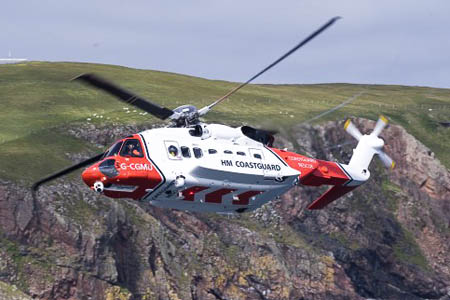Rescue helicopters will continue to fly next week despite a strike involving up to 270,000 public-sector workers.
The Marine and Coastguard Agency said its emergency aircraft will still be responding to calls during the 48-hour strike called by members of the Public and Commercial Services Union. Coastguard helicopters provide emergency help for stricken sea cliff climbers and also take part in mountain rescues in northern Scotland.
The strike involves co-ordinators in charge of rescue operations. The stoppage will take place on 8 and 9 March. MCA chief executive, Peter Cardy, said: “Early next week our normal service will be affected by industrial action. Plans are in place to provide cover, but I am encouraging everybody working or playing on the sea or on the beach to take extra care, and to take heed of our safety advice.
“Detailed contingency plans will be in place and although our services will be more limited than usual, the public should know that distress calls will be answered as normal.
“The message is still the same: if you see something that you believe is dangerous or putting people’s lives at risk, don’t delay, dial 999 and ask for the Coastguard, making sure you know your own position.”
The strike is over cuts to redundancy payments for civil and public servants. 63.4 per cent of those voting backed strike action and 81.4 per cent supported an overtime ban.
Further action is planned if the dispute is not resolved.
Mark Serwotka, PCSU general secretary, said: “These cuts, which will see loyal civil and public servants lose tens of thousands of pounds if they are forced out of a job, are more about crude politicking than making savings.
“We have suggested ways in which the Government can make these savings whilst protecting the rights of existing members, yet it seems intent on penalising the people who keep this country running.
“With civil and public service jobs increasingly at risk, this is a cynical attempt to cut jobs on the cheap which will ultimately damage the services we all rely on. The Government needs to recognise the depth of anger which has been demonstrated by this ballot result and find the political will to negotiate a settlement that avoids a sustained campaign of industrial action.”
Britain’s volunteer mountain rescue teams are supported by helicopter crews from the MCA, particularly in north-west Scotland. The MCA helicopter crews also regularly aid injured climbers on sea cliffs in the South West of England.
Sea King helicopters operated by the RAF and Royal Navy operate separately from the MCA craft.
